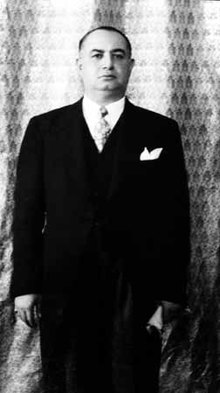Husni az-Za'im

Husni az-Za'im ( Arabic حسني الزعيم, DMG Ḥusnī az-Zaʿīm ; * 1897 in Aleppo ; † August 14, 1949 near Damascus ) was a Syrian military and politician during the time of the Syrian Republic .
Life
Husni az-Za'im was born a subject of the Ottoman Sultan . He was a member of the Syrian Kurdish minority . He joined the army and made it an officer in the Ottoman army . After France had implemented the League of Nations mandate for Syria and Lebanon in the period after the First World War , he became an officer in the French army . After Syria's independence, he became Chief of the General Staff and led the Syrian armed forces to war against Israel in 1948 . The Arabs' defeat in that war shocked Syria and undermined confidence in the country's parliamentary system of government.
On April 11, 1949, al -Za'im deposed Syrian President Shukri al-Quwatli in a bloodless coup , who was briefly imprisoned and then exiled to Egypt . The coup was carried out with the approval of the United States Embassy and with the support of the CIA and possibly promoted by the Syrian Social Nationalist Party , although az-Za'im was not known to be a member. Among the officers who assisted in az-Za'ims were Adib al-Shishakli and Sami al-Hinnawi , both of whom later became the country's military leaders.
Al-Za'im's takeover was the first military coup in Syria. He shook the country's fragile democracy and sparked a series of military revolts. Two more followed in 1949.
Although his rule was relatively mild - no political opponents were executed - al-Za'im soon made enemies. He was a strong opponent of military administration. His policies of secularism and the prospect of female equality by granting them the right to vote for not veiling aroused opposition from Muslim religious leaders. The women's suffrage was only during the third civilian government of Hashim al-Atassi introduced. Rising taxes also turned the businessmen against him, and the Arab nationalists were still dissatisfied with the signing of the 1949 armistice with Israel and his contracts with American oil companies. After all, the construction of the Trans-Arab pipeline was favored by the USA.
After he no longer had any support from the population, az-Za'im was ousted by his followers Adib al-Shishakli and Sami al-Hinnawi after only four and a half months. When al-Hinnawi came to power as the leader of a junta , Husni al- Za'im was imprisoned and then executed in Mezze prison along with Prime Minister Muhsin al-Barazi .
literature
- Sami M. Moubayed: Syria and the USA: Washington's Relations with Damascus from Wilson to Eisenhower. IB Tauris, 2012, ISBN 978-1-84885-705-6 .
Web links
- Newspaper article about Husni az-Za'im in the 20th century press kit of the ZBW - Leibniz Information Center for Economics .
Individual evidence
- ↑ The Little Encyclopedia. Volume 1, Encyclios-Verlag, Zurich 1950, p. 746.
- ↑ Sami Moubayed: Steel & Silk: Men and Women who shaped Syria 1900-2000. 2006, ISBN 1-885942-41-9 .
| personal data | |
|---|---|
| SURNAME | Husni az-Za'im |
| ALTERNATIVE NAMES | حسني الزعيم (Arabic) |
| BRIEF DESCRIPTION | Syrian military and politician during the Syrian Republic |
| DATE OF BIRTH | 1897 |
| PLACE OF BIRTH | Aleppo , Syria |
| DATE OF DEATH | August 14, 1949 |
| Place of death | at Damascus |

